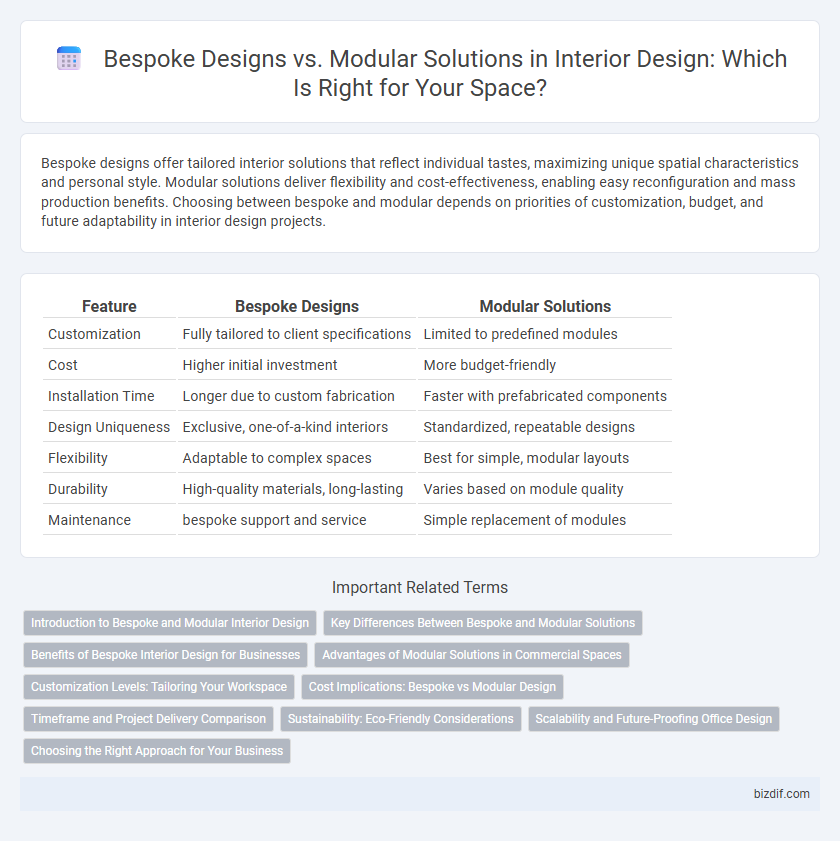Bespoke designs offer tailored interior solutions that reflect individual tastes, maximizing unique spatial characteristics and personal style. Modular solutions deliver flexibility and cost-effectiveness, enabling easy reconfiguration and mass production benefits. Choosing between bespoke and modular depends on priorities of customization, budget, and future adaptability in interior design projects.
Table of Comparison
| Feature | Bespoke Designs | Modular Solutions |
|---|---|---|
| Customization | Fully tailored to client specifications | Limited to predefined modules |
| Cost | Higher initial investment | More budget-friendly |
| Installation Time | Longer due to custom fabrication | Faster with prefabricated components |
| Design Uniqueness | Exclusive, one-of-a-kind interiors | Standardized, repeatable designs |
| Flexibility | Adaptable to complex spaces | Best for simple, modular layouts |
| Durability | High-quality materials, long-lasting | Varies based on module quality |
| Maintenance | bespoke support and service | Simple replacement of modules |
Introduction to Bespoke and Modular Interior Design
Bespoke interior design offers fully customized solutions tailored to individual tastes, spatial requirements, and lifestyle needs, ensuring unique and highly personalized living spaces. Modular interior design utilizes pre-fabricated units that are flexible, cost-effective, and easy to install, promoting efficient space optimization and quick transformations. Both approaches address different design goals, with bespoke emphasizing exclusivity and modular focusing on adaptability and scalability.
Key Differences Between Bespoke and Modular Solutions
Bespoke designs in interior design prioritize customization and individuality, tailoring each element to client specifications for a unique, one-of-a-kind environment. Modular solutions emphasize efficiency and scalability, utilizing standardized components that enable faster installation and easier reconfiguration. Key differences include the level of personalization, cost implications, and flexibility, with bespoke designs generally demanding higher investment for exclusive aesthetics, while modular options offer practical adaptability and budget-friendly alternatives.
Benefits of Bespoke Interior Design for Businesses
Bespoke interior design offers businesses unparalleled customization, allowing spaces to reflect unique brand identities and enhance customer experiences. Tailored designs optimize space utilization, improve workflow efficiency, and support specific business needs that modular solutions may not address. Investing in bespoke interiors often leads to increased employee satisfaction and stronger client impressions, driving long-term business success.
Advantages of Modular Solutions in Commercial Spaces
Modular solutions in commercial interior design offer unparalleled flexibility and scalability, allowing businesses to easily reconfigure spaces to adapt to evolving operational needs. These designs promote cost efficiency through standardized components that reduce installation time and maintenance expenses while supporting sustainability with reusable materials. Enhanced customization options within modular systems ensure a seamless integration of branding elements, optimizing functionality and aesthetics for a dynamic commercial environment.
Customization Levels: Tailoring Your Workspace
Bespoke designs offer unparalleled customization by allowing every element to be tailored to specific functional and aesthetic requirements, ensuring a unique workspace that reflects individual brand identity. Modular solutions provide flexible options with pre-designed components that can be combined in various configurations, offering moderate customization while enabling quicker installation and cost efficiency. Choosing between bespoke designs and modular solutions depends on the desired level of personalization, budget constraints, and project timeline priorities.
Cost Implications: Bespoke vs Modular Design
Bespoke designs typically involve higher initial costs due to custom craftsmanship and unique materials tailored to specific preferences, often leading to increased labor and production time. Modular solutions offer more cost-effective advantages by utilizing standardized components that reduce manufacturing expenses and allow for easier scalability and quicker installation. Long-term financial impact also varies, as bespoke designs may increase property value through exclusivity, while modular designs provide budget-friendly flexibility and simpler maintenance.
Timeframe and Project Delivery Comparison
Bespoke designs require a longer timeframe due to custom fabrication, tailored materials, and detailed client consultations, often extending project delivery by several weeks or months. Modular solutions offer faster turnaround as pre-fabricated components streamline installation and reduce on-site work, enabling quicker project completion. Choosing between bespoke and modular approaches depends on balancing the need for unique personalization with the demand for expedited delivery schedules.
Sustainability: Eco-Friendly Considerations
Bespoke designs prioritize sustainability by using locally sourced, natural materials and minimizing waste through tailored production processes. Modular solutions support eco-friendly considerations by promoting reuse and adaptability, reducing the need for frequent replacements or renovations. Both approaches contribute to sustainable interior design by enhancing resource efficiency and lowering environmental impact.
Scalability and Future-Proofing Office Design
Bespoke designs offer unparalleled scalability by allowing tailored layouts and custom features that adapt seamlessly as office needs evolve. Modular solutions enable future-proofing with flexible, reconfigurable components that accommodate changing team sizes and technology integrations. Choosing between bespoke and modular office design hinges on prioritizing personalized adaptability versus cost-effective, rapid scalability.
Choosing the Right Approach for Your Business
Bespoke designs offer customized interiors tailored uniquely to a business's brand identity and spatial requirements, enhancing exclusivity and personalized customer experiences. Modular solutions provide flexibility and cost-efficiency through prefabricated components that allow for rapid installation and easy reconfiguration to adapt to evolving business needs. Evaluating factors such as budget, timeline, scalability, and brand distinctiveness is crucial for selecting the optimal interior design approach that aligns with organizational goals.
Bespoke Designs vs Modular Solutions Infographic

 bizdif.com
bizdif.com